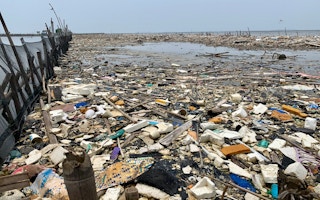Imagine you are the captain of a ship. Maybe it’s a dive boat or a fishing vessel. For a while now you’ve been catching more plastic than fish. Or your dive guests have ended their trip early, because all they’ve seen is floating plastic waste strewn over dead coral reefs. At some point you decide to quit your job. You want to do something about the plastic crisis by fishing the stuff out of the water and recycling it.
To continue reading, subscribe to Eco‑Business.
There's something for everyone. We offer a range of subscription plans.
- Access our stories and receive our Insights Weekly newsletter with the free EB Member plan.
- Unlock unlimited access to our content and archive with EB Circle.
- Publish your content with EB Premium.
In recent years, people who match this description have started popping up all over Southeast Asia, many of them in Indonesia. By collecting and recycling some plastic waste these entrepreneurial firms do a good job of raising awareness of the plastic pollution crisis and making people feel that something is being done to save our seas. But the impact these businesses are having at reducing the estimated 4.9 million tonnes of mismanaged waste in Indonesia every year is, sadly, a drop in the ocean.
For many years I have been looking into voluntary plastic collection schemes in Indonesia. Some of them are run by Western cowboys with good intentions. Some are set up by plastic-producers. Some have grown out of Indonesian businesses. But they all claim to be working on solving the same problem: an overproduction of plastics by industries that push short-lived products and single-use packaging into markets that have little or no waste management infrastructure.
Nobody really knows how many million tonnes of polymers are spewed over Indonesia’s 17,000 islands every year, but according to rough estimates Indonesia recycles about 10 per cent of the plastic it consumes. Voluntary collection schemes contribute to recycling rates, but most collect a few thousand tonnes of household plastic waste per year, a tiny fraction of the 7.8 million tonnes of plastic waste Indonesia produces annually. A much bigger proportion of household waste is collected by informal sector workers, meaning poor waste pickers and aggregators that process material up to the top of the food chain and those who own their own shredding lines.
Rubbish in, rubbish out
Together with Norwegian environmental non-profit Grid Arendal I have studied some of these voluntary collection schemes. We analysed seven initiatives using a SWOT matrix – we looked at the strengths, weaknesses, opportunities and threats facing these businesses.
We found that most of them are very good at complying with national waste legislation. They create jobs, do research, write reports, some even promote gender equality. But they are fundamentally flawed because most household waste in Indonesia consists of low value plastics such as multilayered packaging. This means that the plastic collected is usually contaminated and hard to sell on and recycle, so most of the stuff that plastic collecting firms collect ends up in landfills, not recycled. Rubbish in, rubbish out, as the saying goes.
Having looked into this, I am left with the impression that some of these initiatives allow plastic industries to greenwash themselves, or to suggest that they are helping to fix the plastic waste issue in Southeast Asia – ocean plastic in particular, which is where I think the most greenwashing happens. The reality is that these initiatives are like wild roses that constantly need money rain from investors, foundations or the multinationals that back them – otherwise they will go bust.
Gold diggers and masters of spin
After a short period of time, the captains of struggling waste collection businesses become gold diggers for high-value plastic. The gold they’re looking for is polyethylene terephthalate (PET) bottles – recycled PET flakes promise profits. It is estimated that around one third of PET bottles remain uncollected in Indonesia. Collection rates are even lower elsewhere in Southeast Asia, and I was not surprised to find PET bottles from the Philippines, Malaysia and Timor Leste on a recent stroll on a beach in Northern Indonesia.
It’s all very well collecting PET, which has value. But what about other types of plastic that are harder to collect and recycle? Some of the PET collection initiatives seem to be profiting from poor people’s waste problems, and providing unwanted competition for traditional waste pickers, rather than adding value to a broken system.
Some other initiatives follow a more holistic concept, but their impact is questionable, while desperately claiming their operation is a success and a step towards a circular economy. Sometimes such narratives are led by polluting plastic industries, whose marketing experts spin the frontline of plastic management into a public relations spectacle. While small steps are necessary, we need scale. And we have to sprint to meet reduction and recycling goals. The Indonesian government’s super-ambitious goal is to reduce waste generation by 30 per cent and manage 70 per cent of waste by 2025.
Mandatory rules and polluters pay
Countries like Indonesia need an urgent strategic build-up of the waste sector, financed by industry, to treat plastic addiction. Even though extended producer responsibility (EPR) laws failed to reduce plastic waste across Europe, where most states followed the concept through legislation, it is inevitable that polluter pays laws will introduce similar fees per tonne rules. Combined with targeted bans on specific types of packaging such as multilayered plastics and the notorious sachets that clog Indonesian waterways, mandatory EPR has the potential to secure much-needed funding to fight plastic pollution – it’s the best weapon we have.
Voluntary initiatives have the potential to replace or delay mandatory legislation. Pressured governments and opportunistic corporations can claim progress from these schemes, even though what they’ve achieved massively falls short of what needs to be done. While the leaders of voluntary schemes may wrongly claim to be saviors of the Global South’s waterways, their efforts must be appreciated. There is a place for their work in a system with more clearly defined rules, more funding for the sector from the private sector, and a strategic upscaling of collection initiatives. Also, while ocean plastics are part of the problem, the narrative distracts from the massive environmental impact of plastic pollution on land, that might need even more urgent intervention.
To cope with the flood of unmanaged plastic waste, countries in Southeast Asia not only need collection and recycling infrastructure. They need education campaigns that encourage consumers to reduce and reuse plastics. For years, recycling has wrongly been promoted as the panacea for the world’s plastic addiction. Plastic waste should be reused, refilled or repaired – recycling comes next in the needs hierachy. This requires education campaigning and capacity-building which should be financed by plastic-polluting companies through tougher legislation.
Benedict Wermter is a freelance journalist, co-creator of the documentary The Recycling Myth and author of The Plastics Addiction, an investigation into the plastics trade.


















